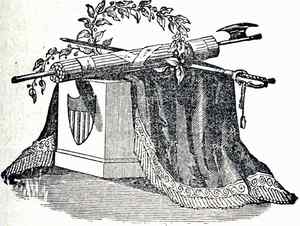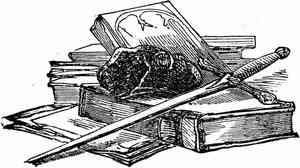Thrilling Incidents In American History
• Preface
Revolutionary War
• Opening Of The Revolution
• The Boston Massacre
• Affair of the Sloop Liberty
• Affair of the Gaspee
• The Tea Riot
• The Boston Port Bill
• The First Continental Congress-Consequent Parliamentary proceedings
• Organization of the Minute-Men
• Patrick Henry-Second Provincial Congress-First Military Enterprise
• Battles of Lexington and Concord
• Battle of Bunker's Hill
• Capture of Ticonderoga
• Second Continental Congress-Washington's Appointment
• Siege of Boston
• Incidents at the Evacuation of Boston
• Burning of Falmouth
• Arnold's Expedition to Quebec
• Siege of Quebec, and Death of Montgomery
• Scenes at Quebec during the Siege
• Expedition against Charleston
• The Declaration of Independence
• The Battle of Long Island
• Washington's Retreat through New Jersey-Capture of General Lee
• Battle of Trenton
• Battle of Princeton
• Capture of General Prescott
• Battle of Brandywine
• Battle of Germantown
• Battle of Red-Bank
• Attack on Fort Mifflin-Retirement of the Army to Valley Forge
• Battle of Bennington
• Murder of Miss M'Crea
• Battle of Stillwater
• Battle of Bemis' Heights, and Retreat of Burgoyne
• Capture of Forts Clinton and Montgomery
• Surrender of Burgoyne
• The Treaty with France
• Attack on Savannah, and Death of Pulaski
• Storming of Stony Point
• General Sullivan's Campaign against the Mohawks
• Tarleton's Quarters
• Battle of Camden, and Death of De Kalb
• Arnold's Treason
• The Loss of the Randolph
• The British Prison-Ships
• Capture of the Serapis
• Putnam's Feat at Horseneck
• Battle of Eutaw Springs
• Wayne's Charge at Green Spring
• Capture of the General Monk
• The Mutinies
• Battle of the Cowpens
• Capture of New London
• Massacre of Wyoming
• Surrender of Cornwallis
War With France
• Capture of L'Insurgente
• The Constellation and Vengeance
War With Tripoli
• Burning of the Philadelphia
• Bombardment of Tripoli
• Loss of the Intrepid
• Expedition of General Eaton
Second War With England
• Battle of Tippecanoe
• Capture of the Guerriere
• Tragical Affair of an Indian Chief
• Battle and Massacre at the River Raisin
• Captain Holmes's Expedition
• Capture of the Caledonia and Detroit
• The Wasp and Frolic
• Gallant Conduct of Lieutenant Allen at the Capture of the Macedonian
• Capture and Destruction of the Java
• Siege of Fort Meigs
• Capture of York, and Death of General Pike
• Defence of Sackett's Harbour
• Defence of Fort Stephenson
• Battle of Lake Erie
• Battle of the Thames
• Gallant Action of Commodore Chauncey under the guns of Kingston Citadel
• The Sacking of Hampton
• Capture of the Peacock
• Massacre at Fort Mimms
• Surrender of Weatherford
• Battle of Niagara
• BattIe of New Orleans
War With Mexico
• Battle of Palo Alto
• Battle of Resaca de la Palma
• Capture of Monterey
• Battle in the Streets of Monterey
• Thrilling Scenes in the Battle of Buena Vista
• Bombardment of Vera Cruz
• Battle of Cerro Gordo
• Battles of Contreras and Churubusco
• Storming of Chapultepec


Washington

SECOND CONTINENTAL CONGRESS -- WASHINGTON'S APPOINTMENT.
 EANTIME Congress, having
met on the 10th of May, received a report of these transactions, which called
for their most earnest consideration. Some, it is said,
were unprepared for so serious a result; but the general resolution was to
follow it up, and place all the colonies in a posture of military defence.
Still, before adopting any active measures, they determined, though with some
dissentient voices, to make fresh appeals to the king ond people of Great
Britain. To his majesty they professed as strongly as ever their devotion to
his person, family, and government; their deep regret at any event which
could weaken their connexion with
his crown, and their ardent desire for the restoration of harmony. To the people
they strenuously repelled the charge of aiming at independence, which none of
their actions were said to justify. They had never made overtures to any foreign
power, nor availed themselves of the weak state of the cities, to become
masters of them. The late hostilities had been
merely the repulse of a
wanton attack; they had
lamented the wounds they were obliged to give, and
had not yet learned to rejoice
at a victory over
Englishmen. The armies were said to be raised with objects purely defensive, and
the fortresses seized merely as a preventive against invasion from Canada.
Complaining, however, that the clemency of their sovereign was diverted, that
their petitions were treated with indignity, and that their prayers were
answered by insults; they dreaded that the. nation wanted either the will or the
power to assist them. In that case, they expressed a firm determination that,
"while we revere the memory of our gallant and virtuous ancestors, we never can
surrender those glorious privileges for which they fought, bled, and
conquered;- your fleets and armies can destroy our towns and ravage our
coasts; these are inconsiderable objects,-- things of no moment to men
whose bosoms glow with the ardour of liberty. We can retire beyond the reach of
your navy, and, without any sensible dimunition of the necessaries of life,
enjoy a luxury, which from that period you will want,-the luxury of being
free."
EANTIME Congress, having
met on the 10th of May, received a report of these transactions, which called
for their most earnest consideration. Some, it is said,
were unprepared for so serious a result; but the general resolution was to
follow it up, and place all the colonies in a posture of military defence.
Still, before adopting any active measures, they determined, though with some
dissentient voices, to make fresh appeals to the king ond people of Great
Britain. To his majesty they professed as strongly as ever their devotion to
his person, family, and government; their deep regret at any event which
could weaken their connexion with
his crown, and their ardent desire for the restoration of harmony. To the people
they strenuously repelled the charge of aiming at independence, which none of
their actions were said to justify. They had never made overtures to any foreign
power, nor availed themselves of the weak state of the cities, to become
masters of them. The late hostilities had been
merely the repulse of a
wanton attack; they had
lamented the wounds they were obliged to give, and
had not yet learned to rejoice
at a victory over
Englishmen. The armies were said to be raised with objects purely defensive, and
the fortresses seized merely as a preventive against invasion from Canada.
Complaining, however, that the clemency of their sovereign was diverted, that
their petitions were treated with indignity, and that their prayers were
answered by insults; they dreaded that the. nation wanted either the will or the
power to assist them. In that case, they expressed a firm determination that,
"while we revere the memory of our gallant and virtuous ancestors, we never can
surrender those glorious privileges for which they fought, bled, and
conquered;- your fleets and armies can destroy our towns and ravage our
coasts; these are inconsiderable objects,-- things of no moment to men
whose bosoms glow with the ardour of liberty. We can retire beyond the reach of
your navy, and, without any sensible dimunition of the necessaries of life,
enjoy a luxury, which from that period you will want,-the luxury of being
free."
Having emitted these declarations, Congress proceeded to make military arrangements which should comprehend the whole range of the colonies. All the troops within their limits were to be now called the Continental Army; committees were appointed to devise ways and means for supporting and supplying it with arms and stores, and preparing regulations for its government. An issue of paper-money was voted to the amount of three millions of dollars. The first object was considered to be the choice of a commander, and in this respect they were singularly fortunate. There had at this time sprung up among them an uncommon number of men of distinguished abilities; and though some were in this respect superior to him, it was generally agreed that the fittest person was George Washington. Without very brilliant talents, or even very extensive information, he possessed sound sense, comprehensive views, a deep and devoted patriotism. These had been displayed in a manner so firm, simple, and manly, as rendered it impossible even to entertain a doubt of the thorough dependence which might be placed on his fidelity to the cause. A bold and enterprising spirit was tempered with a feeling of actual difficulties, sometimes even extreme, which prevented it from degenerating into rashness. His steady honour and humanity softened the horrors of a contest, which among the lower class of statesmen excited the most imbittered feelings. Apprehensions were entertained that Massachusetts, in virtue of her great exertions, would claim the nomination ; but Mr. Adams, her leading deputy, was the first to propose the Virginian, and the recommendation, being submitted to ballot, was unanimously approved. Next day the choice was announced to him, when, in a plain, modest reply, he expressed his high sense of the honour, not concealing he pain which arose from a consciousness that his abilities and military experience might not be equal to so mighty a trust. Yet he assured them he would enter on the momentous duty, and exert every power he possessed in so great a cause. Five hundred dollars monthly had been voted for his pay and expenses; but being possessed of an ample fortune, he declined anything beyond the reimbursement of his actual outlay.
